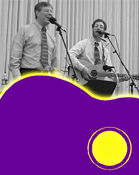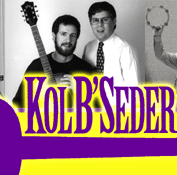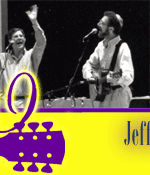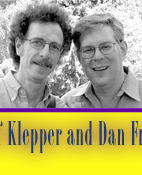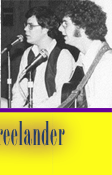It’s 1973. The year after Debbie Friedman’s debut album “Sing Unto God,” Michael Isaacson’s groundbreaking “Folk Service,” and the first “Songs NFTY Sings” LP. The era of Jewish liturgical folk music writing has just started to bloom. Two college students, Jeff Klepper and Dan Freelander, sit in Klepper’s Boston apartment with a guitar and tape recorder, collaborating on a new setting for “Shalom Rav.” Klepper, a songleader trained at NFTY’s U.A.H.C. Kutz Camp, tries out chords on his guitar; Freelander, a voice major at the Hartt School of Music and Trinity College, contributes with varied vocal lines. After some trial and error, they emerge with what will become one of their most widely known songs. For many Reform Jewish youth group members during this time, and for countless others since, the session would be a forgotten yet historic moment in the history of Jewish liturgical folk music.
Kol B’Seder is Hebrew for “Everything’s OK”—or, more whimsically, “a decent voice.” It is also the name of one of the pioneering groups devoted to composing and fostering what is sometimes called “American Nusach”: the late 20th century refashioning of liberal Jewish worship to reflect the attitudes and beliefs of life in North America.
Kol B’Seder began as a friendship between Jeff Klepper and Dan Freelander. Jeff had grown up in New York City, a student and alto soloist under renowned Jewish composer A.W. Binder. His interest in such social awareness singers as Pete Seeger, Phil Ochs and Bob Dylan compelled him to learn the instruments and vocal styles of the emerging folk music revival. Dan grew up in Worcester, Massachusetts, singing the music of cantor/composer Hugo Chaim Adler. Both men underwent transformative experiences at the U.A.H.C. Joseph Eisner Camp in the late 1960s, and Klepper studied songleading with Debbie Friedman and Jim Schulman at the Kutz Camp Songleader Institute in 1969. Each went on to take positions of leadership in his respective local youth group.
The two met formally for the first time as leaders for a regional NFTY retreat in December 1971; their true bonding experience took place during summer 1972, when they drove to Colorado together to attend a national Jewish education conference. They sang in the car; they sang at the conference; they even recorded a short record of songs for Jewish schools. When they returned east, the pair decided to take their show on the road. Over the next two years, they performed occasionally at youth group and college events, and wrote many of the songs for which they are best known, including “Lo Alecha,” “Tov L’hodot,” “V’yashvu Ish” and “Modeh Ani.”
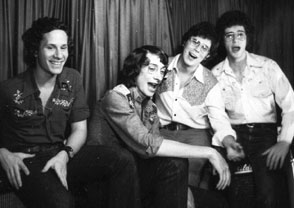 |
|
The Original Kol B'Seder Band
|
The actual name “Kol B’Seder” came later, in New York City, when Jeff began his first year of cantorial school at the Hebrew Union College School of Sacred Music in 1974. Working with fellow Camp Eisner songleader Loui Dobin, Klepper organized a musical collective of H.U.C. and college students, taking the Matthew Lazar/David Burger-led band Tayku as one of his inspirations. Dobin was a co-leader and rhythm guitarist; the group also brought in Steve Samuels on drums, joined later by cantorial student Steve Puzarne on bass and flute. Dan Freelander was in Jerusalem for his first year of rabbinic school, but became the group’s lead vocalist upon his return in 1975.
Throughout the late 1970s Kol B’Seder—the band—played frequently at Jewish community events, performed alongside Shlomo Carlebach for Israel’s 30th birthday celebration in Central Park, and even expanded its repertoire sufficiently to play youth group dances and the occasional Bar Mitzvah.
By 1981 key members Dobin and Puzarne had graduated and gone on to jobs spread well across the country. When the group recorded its first album, “Shalom Rav: Kol B’Seder in Concert” at Kutz Camp that year, Jeff Klepper and Dan Freelander were the sole members.
In the ensuing years, as Klepper took a cantorial position in Evanston, Illinois and Freelander worked as a U.A.H.C. executive in New York, the duo continued to perform whenever travel would allow. Their concerts at the annual summer Conference on Alternatives in Jewish Education (C.A.J.E.) were particularly beloved: they could be seen and heard in all their splendor, leading eager audiences in their classic songs, introducing their latest compositions, and exchanging Smothers Brothers-like banter while spicing their act up with riotous song parodies. Kol B’Seder’s well-regarded place at C.A.J.E. also gave them a platform for introducing a new generation of Jewish musical artists. Under their gaze, Craig Taubman, Doug Cotler and others gained their first national audiences. Kol B’Seder’s recordings, meanwhile — especially “The Bridge” (1985) and “Sparks of Torah” (1989) — continued to inspire new generations of songleaders and a growing legion of cantors, rabbis and Jewish professionals.
Now, 30 years after the session that produced “Shalom Rav,” it is a good time to look back. Just like many of their camp and H.U.C. contemporaries, both Klepper and Freelander have grown into roles of prominence in Reform Judaism and the Jewish music scene. Loui Dobin recently celebrated his 25th year as the director of the Greene Family Camp in Bruceville, Texas. Dr. Michael Isaacson has fulfilled his promise as a prolific and oft-heard composer in both the sacred and secular realms. Debbie Friedman has sold well over a quarter million albums and headlined at Carnegie Hall. The songs and prayer settings written by the many young people motivated to take Jewish musical tradition into their own hands continue to resound through camp dining halls and synagogue sanctuaries, spreading far beyond U.S. borders via songbooks and CDs.
It is important to remember Kol B’Seder as one of the earliest and most influential contributors to this chorus of religious expression; their story is an important one in illustrating how such voices have grown and matured to represent, for many, the voice of a people.
For more photos, Kol B'seder memorabilia, music files
and rare recordings, visit the ARCHIVES page.
|
|
